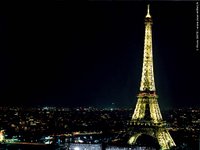
I had an amazing talk with my friend Mark tonight. After dinner we adjourned to the local caffiene watering-hole and then, while our loving, patient spouses pushed on ahead of us, we circled the shopping center about four times, talking animatedly like Kant and Goethe, even making the Kaiser get off the sidewalk for us.
First, Mark is a great "cheerleader." He is able to see where you are and where you need to go, and is very capable of getting you to go there. I don't know if we would have made it to France without his wisdom and counsel.
Second, Mark has an amazing grasp of where we are philosophically and theologically. I've been working on a pet theory about the state of evangelicalism today. We evangelicals have a rationalist streak that makes us, for all intents and purposes, practical atheists. By this I mean that we believe that we can rationally apprehend and comprehend the word of God without recourse to his Spirit or revelation. We then proceed to puff and wobble our way through this matrix called life and pretend that we've got it all together.
But what has slowly come about in my thinking is what we do as evangelicals, i.e., our ability to objectivize and manipulate others. I came to this conclusion as I thought through what the French refer to as the "other." Emmanuel Levinas and others reacted to Martin Heidegger and his ontology and program of capital B "Being," which focuses on the subject, and as a result turns everyone who is not me into an object that I can brand, categorize, and otherwise manipulate. The ultimate logical conclusion of this was the abiltity of the Nazis to turn six million Jews into faceless cattle, brand them, and put them to death.
Levinas reacted to this ontology with the idea of the "other," the one who isn't me. I do not have the ability or the right to treat the "other" as an object for me to manipulate. The "other" has a face, and the "other" begins where I end. Levinas' reaction came not only as a response to Heidegger and his ontology, but also as a result of the French crisis with the Algerians in the 1950's, and the the potential civil war of the 1960's that caused Charles De Gaulle to walk away from the government because he could not order French soldiers to fire upon French citizens.
Obviously this is somewhat of an over-simplification, but the point of this is that the French have tried to see others as the "other," and not as a statistic, number, or whatever. Granted, this is all part of their humanist worldview, but be that as it may, evangelicalism has this down pat. We gather a bunch of people together and paste a label on them, such as "pagans," "unsaved," homosexual," "feminists," and so on. Once they have a label, I can put them on the shelf, and now I can deal with them, I can manipulate them, and I can react to them without getting involved with them.
As Mark pointed out, evangelicals are still locked into a modernist, enlightenment philosophy that drives their theology, ecclesiology, and practice. Which is also why countries in Europe such as France, Germany, and Austria reject Christianity. They look at what we have to offer (our brand of Christianity), see the modernist trappings, and ask us why they would want it? It is like telling someone that we will give them a new television for their birthday, pull out a 1961 black and white Philco, and then wonder why they don't fall over themselves in appreciation.
All this to say that we evangelicals are in trouble. Why are people walking away from the church? Go buy a vowel.
![]()
23 July 2004
Evangelicals and Modernism
17 July 2004
July 17

I was recently in France visiting Paris and Grenoble. Everyone I spoke to had weblogs, and I realized that this format would allow me to lay down some thoughts without structure or context (hence the title "sans contexte"), and not have it look like someone's term paper or whatever.
Since this is the first blog, and I haven't gathered much material yet, so there isn't much on this page. It will gather momentum, however (I hope).
While I was in Grenoble, the July 2004 issue of the French magazine Le Point printed an interview with Michel Foucault, "l'un des grands penseurs du XXe siecle (one of the great thinkers of the 20th century)." He referred to himself as a pyrotechnist and a geologist, one who investigates the seams and fault lines of a rock formation in order to determine where to put the charges that will bring the entire edifice down in one fell swoop. For Foucault, it was about power.
Several things stand out about Foucault. First, he died of AIDS on June 25, 1984. Much of his study and work stemmed from his own confusion about his sexuality, which led him to study sexuality, power, knowledge, prison reform, and insanity. The interesting fact is that you don't read too much about philosophers dying of AIDS. I guess that they are human as well.
The second thing is the definition of his role in the world. He refers to himself as the explosives expert that knows the geology of the social terrain, and how to read the various strata and where to place the explosive charge in order to do the maximum effect with the least amount of explosive. His role in society was to bring down the walls of society that not only marginalized people, but neatly tucked them away and hid them under a label so that they wouldn't have faces. As one philosopher put it, Foucault fought every form of exclusion and every form of oppression.
What strikes me about his self-defined role is that I've always thought that this is what Christians were supposed to do. When you look at the role Christians played in the first few centuries of the church's existence, they were the pyrotechnists who worked to bring down the barriers that society erected, which defined what reality was really about. But it seems that once poor Constantine got into power, he legitimized Christianity and made it a legal religion, it's been downhill ever since.
So, the Christians have to learn from the non-Christians. Which is part of why France intrigues me so. Religion does not have much influence in France, and Christianity even less so. You have a culture that has marginalized Christianity to the point that is has virtually no influence on daily life.
This leaves Christians with the task to find a way to live the gospel in french culture that is not laden with all the baggage that Christianity currently schleps with it, and has form and power in a biblical sense.
Part of the role for this weblog for me, at least, is to think through and discuss what all this means. Someday I hope to be in France and to live the gospel in their midst. But before I do that, I need to figure out what the french culture is about, and how I can live in this culture, know how it thinks, what their world views are, and their presuppositions and so on.
The other part of this task is to unpackage the church , and free it from the cultural wrappings that it lives in.
Thanks for listening.




